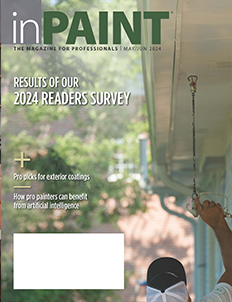Scheduling details critical for health care jobs
 During the Great Recession, health care construction was a lone bright spot at a time when building and renovation opportunities were scarce for all trades. Whether it be new construction or renovations, the health care market is still strong today. But these jobs can bring complexities that are likely unseen in other commercial categories. Jim Guthrie, senior project manager for Skokie, IL-based Hester Painting & Decorating, highlights several unique challenges that come with lucrative health care work.
During the Great Recession, health care construction was a lone bright spot at a time when building and renovation opportunities were scarce for all trades. Whether it be new construction or renovations, the health care market is still strong today. But these jobs can bring complexities that are likely unseen in other commercial categories. Jim Guthrie, senior project manager for Skokie, IL-based Hester Painting & Decorating, highlights several unique challenges that come with lucrative health care work.
WHERE YOU FIT IN THE SCHEDULE
For most health care work involving multiple trades—whether it’s new construction or a large renovation—schedules are primarily built around HVAC, plumbing and electrical, what Guthrie refers to as ‘critical path activities.’ In health care environments, paint pros should expect and anticipate delays and very short time windows for paint work.
“Delays due to re-engineering of M/E/Ps consumes a lot of our time on the schedule by delaying the drywall contractor from finishing their work, or waiting on city inspections in order to close up ceilings and walls,” he said.
WORKING IN PHASES
Health care often sees its share of phased jobs, Guthrie added. This means paint pros can only work in select areas for certain periods of times. It’s not uncommon to be asked to completely demobilize between phases, which requires materials to be removed and then returned for the next phase. Make sure materials are labelled accordingly so that crews know certain materials are going back to a job site.
Phased jobs can also pose a problem for crew scheduling. “Ideally, you want the same guys to return for the next phase, however, they may already be on another project, forcing you to have new guys get badges, and go through the safety orientations in order to work on the site. This all costs time and money,” Guthrie added.
OTHER SCHEDULING FACTORS, PREP
When bidding, pay attention to scheduling. Will your crews be working days, or nights? Weekends? These elements will impact your payroll, he adds.
Unique prep considerations often come up in health care environments as well. Guthrie’s teams like to use Festool products to eliminate dust when sanding. HEPA filters may also be required, and creating negative air enclosures to eliminate dust from areas outside a containment zone could also be needed. In the end, these details could cost extra money and time you want to make sure you’re compensated for.
“We want our project to look great and perform as intended. Taking time to do the prep necessary is a great way to separate the best painters from others,” he said.




